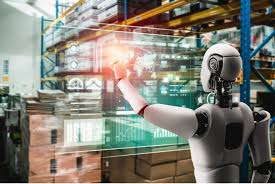How Artificial Intelligence can Help Supply Chain and Logistics
3 min read
We live in a globalized and interconnected landscape, which means that modern supply chains are very fast and complicated. When there is such speed, it is essential to reduce human error and maximize the efficiency of each of the processes involved. Therefore, it is not surprising that artificial intelligence has been the hot topic in technology news and has been gaining ground in supply chain and logistics. There are a number of applications of AI in supply chain, such as data analysis, warehouse management, demand and supply planning, autonomous vehicle and information extraction.
These applications of artificial intelligence can be immensely helpful in the supply chain and logistics sector. How? Read on to find out:
It can reduce operating costs
First and foremost, implementation of artificial intelligence in logistics and supply chain activities can help cut down a great deal of operating costs because many of the procedures are automated and conducted by AI systems. From warehouse management to customer service, the operations can run longer and error-free and with reduced mistakes and incidents, it means your costs can go down significantly.
It can reduce shipping times
Delivery times to customers can also improve with the help of artificial intelligence. Systems become more streamlined and this can eliminate a number of bottlenecks that can often lead to delays. Furthermore, systems powered by artificial intelligence are also capable of analyzing the safest, fastest and most economical shipment method to be used, which can further enhance your supply chain and logistics activities.
It improves customer service
Another great perk of the use of artificial intelligence can be found in the form of chatbots that help in improving customer service. These can offer a wide range of functionality, as they help customers in improving their search, suggest similar products and also send notifications about new products. This saves businesses from having to train their customer support staff, which means lower costs. Most importantly, it also assists customers in finding what they need and without any errors.
It increases productivity
The use of artificial intelligence in supply chain management can help in analyzing the performance of a business and predict new possibilities as well as problems. Different methods, such as supervised and unsupervised learning as well as reinforcement learning are used for identifying possible problems in the supply chain. Not only does it save a lot of time, but these AI-powered automation efforts also reduce the need for warehouse personnel and cut down costs.
It reduces risks
Automated artificial intelligence tools can help ensure efficient warehouse management and better planning, which results in improved material and worker safety. Artificial intelligence can also analyze the workplace safety data and highlight potential risks. Businesses can take quick actions in order to ensure maximum safety of warehouses and compliance with the top safety standards.
It provides process automation
The most important perk of using artificial intelligence for controlling supply chains is automation. Companies can use robots for managing their inventories and warehouses seamlessly. This allows them to perform a variety of tasks, such as locating and picking a product without requiring a lot of people and ensuring smooth operations simultaneously.
It allows better planning
There is a great deal of planning involved in logistics, as there has to be coordination between suppliers, business units and customers. Artificial intelligence solutions can facilitate these planning activities because they can be used for conducting numerical as well as scenario analysis, which are an essential part of planning. Another perk of artificial intelligence is that it is capable of accumulating, filtering and then analyzing large sets of data, which can be helpful in improving inventory management. The system can also be used for tracking consumer habits and make updates to supply and demand accordingly, thereby keeping inventories as low as possible without any disruptions to the supply chain.
The adoption of artificial intelligence is undoubtedly helping logistics and supply chain management change for the better and will continue to do so.




